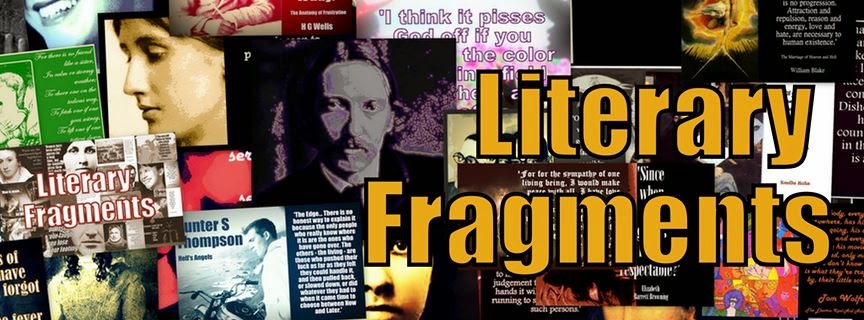“Pienso con frecuencia en esta imagen que sólo yo sigo viendo y de la que nunca he hablado… Muy pronto en mi vida fue demasiado tarde”….
Sunday 28 December 2014
Friday 26 December 2014
Thursday 25 December 2014
Boris Pasternak, Doctor Zhivago
I don't think I could love you so much if you had nothing to complain of and nothing to regret. I don't like people who have never fallen or stumbled. Their virtue is lifeless and of little value. Life hasn't revealed its beauty to them.
Charles Dickens, A Christmas Carol
It is a fair, even-handed, noble adjustment of things, that while there is infection in disease and sorrow, there is nothing in the world so irresistibly contagious as laughter and good humour
Victor Hugo, The Hunchback of Notre-Dame
Love is like a tree: it grows by itself, roots itself deeply in our being and continues to flourish over a heart in ruin. The inexplicable fact is that the blinder it is, the more tenacious it is. It is never stronger than when it is completely unreasonable
Barbara Taylor Bradford, A Woman of Substance
We are each the authors of our own lives, Emma. We live in what we have created. There is no way to shift the blame and no one else to accept the accolades.
Anaïs Nin, The Diary of Anaïs Nin, Vol. 1: 1931-1934
What we call our destiny is truly our character and that character can be altered. The knowledge that we are responsible for our actions and attitudes does not need to be discouraging, because it also means that we are free to change this destiny. One is not in bondage to the past, which has shaped our feelings, to race, inheritance, background. All this can be altered if we have the courage to examine how it formed us. We can alter the chemistry provided we have the courage to dissect the elements.
Markus Zusak, The Book Thief
“Usually we walk around constantly believing ourselves. "I'm okay" we say. "I'm alright". But sometimes the truth arrives on you and you can't get it off. That's when you realize that sometimes it isn't even an answer--it's a question. Even now, I wonder how much of my life is convinced "
Khalil Gibran, The Prophet
“It had flaws, but what does that matter when it comes to matters of the heart? We love what we love. Reason does not enter into it. In many ways, unwise love is the truest love. Anyone can love a thing because. That's as easy as putting a penny in your pocket. But to love something despite. To know the flaws and love them too. That is rare and pure and perfect.
“The hidden well-spring of your soul must needs rise and run murmuring to the sea; and the treasure of your infinite depths would be revealed to your eyes. But let there be no scales to weigh your unknown treasure;
and seek not the depths of your knowledge with staff or sounding line.
For self is a sea boundless and measureless. Say not, “I have found the truth,” but rather, “I have found a truth.” Say not, “I have found the path of the soul.” Say rather, “I have met the soul walking upon my path.”
For the soul walks upon all paths.
The soul walks not upon a line, neither does it grow like a reed.
The soul unfolds itself, like a lotus of countless petals.
“The hidden well-spring of your soul must needs rise and run murmuring to the sea; and the treasure of your infinite depths would be revealed to your eyes. But let there be no scales to weigh your unknown treasure;
and seek not the depths of your knowledge with staff or sounding line.
For self is a sea boundless and measureless. Say not, “I have found the truth,” but rather, “I have found a truth.” Say not, “I have found the path of the soul.” Say rather, “I have met the soul walking upon my path.”
For the soul walks upon all paths.
The soul walks not upon a line, neither does it grow like a reed.
The soul unfolds itself, like a lotus of countless petals.
Christmas Trees, by Robert Frost
|
Saturday 13 December 2014
To Winter by William Blake
|
Thursday 11 December 2014
A Day, by Emily Dickinson
|
Sunday 7 December 2014
Willow Poem, by William Carlos Williams
|
Subscribe to:
Posts (Atom)








